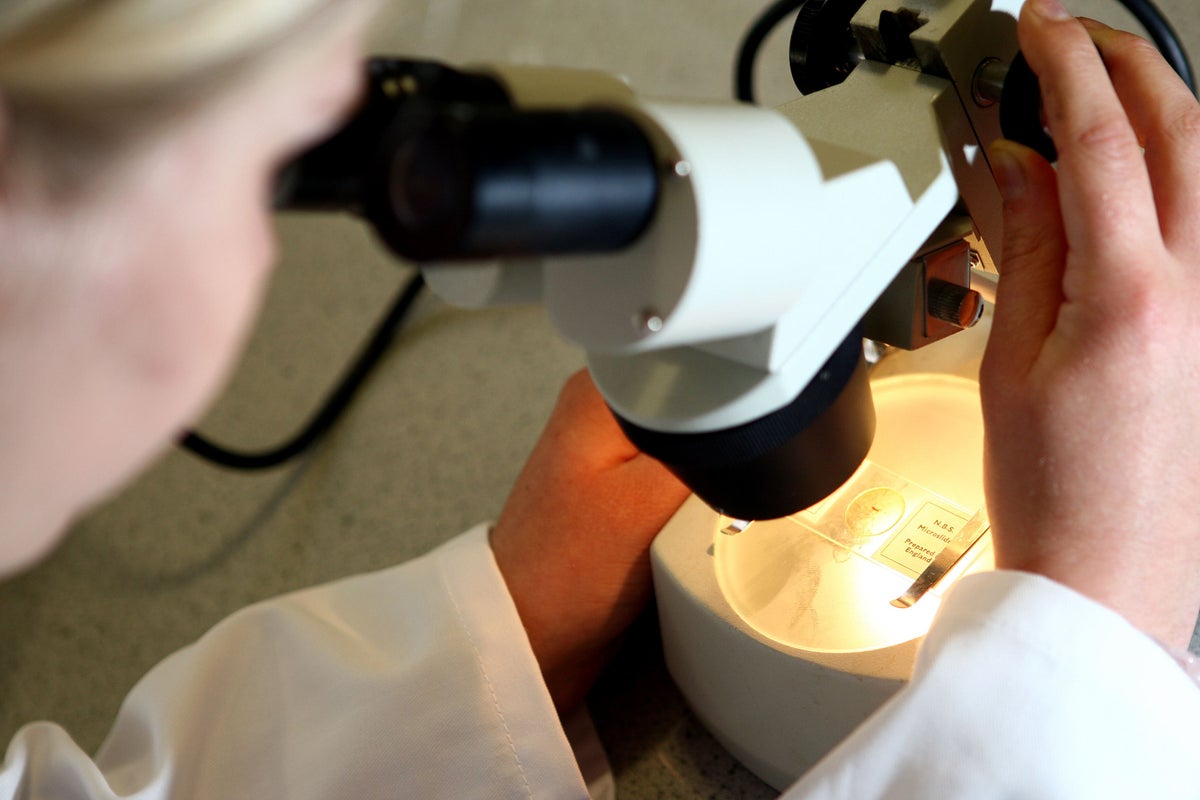
A “mothballed” Covid mega lab currently on sale on the property website Rightmove should instead be used as a research facility to help combat the worsening threat of antibiotic resistance, MPs have said.
The Rosalind Franklin Laboratory in Leamington Spa opened in June 2021 and was the first Covid-19 testing mega lab in the UK, processing around 8.5 million tests during the pandemic.
But it shut in January 2023 – much “to the astonishment of the science and health communities”, and the property “suddenly appeared for sale” in November last year, according to a cross-party group of MPs.
They said the Government should instead use the facility – which has received more than £1 billion of public funding – to research bacteria-killing viruses called phages to help tackle antibiotic resistance as bacteria evolve to become resistant to drugs.
Phages are normally harmless to humans, but can be deadly for bacteria.
They work by penetrating the bacterial membrane and replicating inside the cell until it bursts open, killing the bacterium.
The key to harnessing them for treatment against deadly diseases is to find phages that are extremely efficient at killing strains of bacteria causing them.
The World Health Organisation has described antimicrobial resistance (AMR) as “one of the top global public health and development threats”, saying bacterial AMR was directly responsible for 1.27 million global deaths in 2019 and contributed to 4.95 million deaths.
In its report, published on Wednesday, Parliament’s Science, Innovation & Technology Committee said that the UK is at an “impasse” because phages have not been developed to the required Good Manufacturing Process (GMP), the minimum standard that a medicines manufacturer must meet in their production processes, and hence, cannot be used in clinical trials.
However, the report added, in order to meet the GMP criteria, phages need will need new manufacturing plants but investment in compliant plants will only be justified following successful clinical trials.
It said the UK needs to break this licensing impasse to allow phages to be deployed as live-saving treatment.
Greg Clark, chair of the committee, said: “Phages offer a possible response to the increasing worldwide concerns about antimicrobial resistance.
“But the development of phage therapies is at an impasse, in which clinical trials need new advanced manufacturing plants, but investment requires clinical trials to have demonstrated efficacy.
“The Committee is asking the Government to consider whether the mothballed Rosalind Franklin Laboratory in the West Midlands could provide a suitable facility.
“The Laboratory, which has already received over £1 billion of public funding, was established by the Government to bring to an end the inadequacy of testing capacity that so hampered the national response to Covid.
“It consists of modern, secure laboratory facilities and was meant to be an important source of national resilience against future pandemics.
“But the Rosalind Franklin Laboratory has suddenly appeared for sale on the property website Rightmove, to the astonishment of the science and health communities.
“Our Committee’s report on phages asks for the Rosalind Franklin Laboratory to be considered for this purpose, rather than be lost to the nation and to science in a firesale.”
The Rosalind Franklin Laboratory has suddenly appeared for sale on the property website Rightmove, to the astonishment of the science and health communities— Greg Clark
Phages have been used as therapy for more than 100 years, but have never been licensed for therapeutic use in the UK.
They have only been used as “compassionate” treatments of last resort in isolated cases.
One such case involved a 15-year-old girl with cystic fibrosis who had a deadly bacterial infection and was given less than a 1% chance of survival before being successfully treated with a three-phage cocktail by doctors at Great Ormond Street Hospital in London.
The Committee is calling on the Government, the Medicines and Healthcare Products Regulatory Agency (MHRA), and phage scientists to work together to find a way for phage research to be funded and its products licensed for use.
Is is also urging the MHRA to consider allowing the compassionate use of non-GMP phages produced in the UK for last resort medical cases and to review how current regulations would govern liability for clinicians and hospitals who used these phages.
Professor Joanne Santini, who is based at the UCL Institute for Structural and Molecular Biology and assisted with the report, said: “The Covid pandemic has made us acutely aware of the threat that infectious agents pose to health and healthcare systems.
“The inappropriate use and overuse of antibiotics poses an even greater threat, with millions dying worldwide from infections caused by antimicrobial resistant bacteria.
“Phages are going to be essential weapons in the arsenal to combat AMR.
“Critical to our successful use of phages will be the gathering of evidence from both cases of compassionate access use and clinical trials.
“To make this feasible in the UK, clear regulatory guidelines, manufacturing facilities for production of GMP phages and funding are going to be critical.”







